 Vampire Weekend's Surprising Jewish Stories
Vampire Weekend's Surprising Jewish Stories
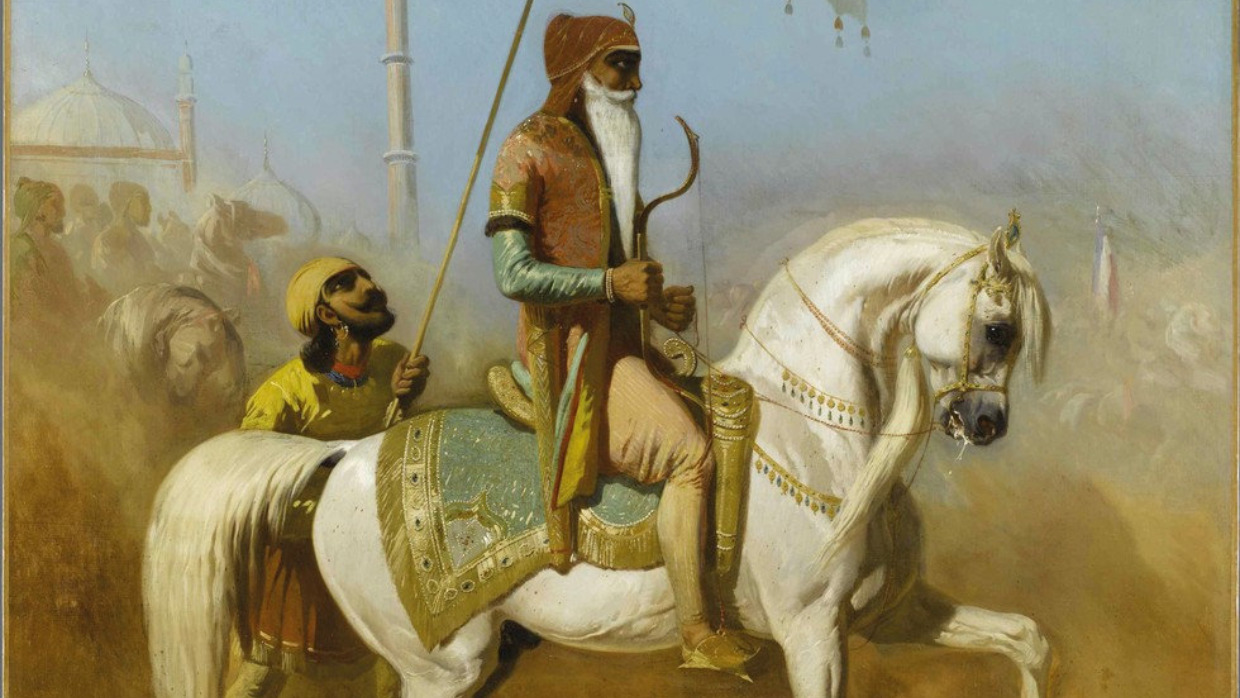

8 min read
A storied kingdom saved the lives of hundreds of Jews.
In the first half of the 19th century, visitors to the Sikh Empire, centered in modern-day Pakistan, were amazed by the splendor of its royal court. London’s Victoria and Albert Museum describes it as “one of the most magnificent in the whole of India.” Ranjit Singh, the maharaja who ruled in opulence, maintained a solid gold throne for state occasions, though he usually preferred to eschew luxury and often sat on the floor with his subjects.
Ranjit Singh was a brilliant military leader and statesman known as “The Lion of the Punjab.” He was a member of the Sikh faith, a monotheistic religion which developed in the 1400s in the Punjab region of the Indian subcontinent. The Sikh Empire he forged stood for 50 years, until it was conquered by British East India forces in 1849. During Ranjit Singh’s rule, the Sikh Empire was known for religious tolerance. In the annals of the region’s bloody history, his rule stood out as a golden age of peace and security.
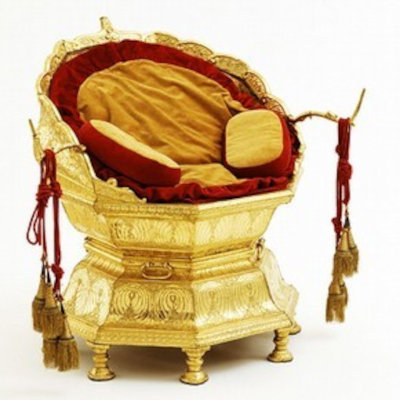 The Golden Throne of Ranjit Singh, about 1820-30, Museum no. 2518(IS)
The Golden Throne of Ranjit Singh, about 1820-30, Museum no. 2518(IS)
In an almost forgotten episode of both Jewish and Sikh history, the Sikh Empire Ranjit Singh founded came to the aid of Jews in their hour of need. In the midst of horrific anti-Jewish violence miles away, the Sikh Empire opened its doors to Jews, helping save hundreds of lives. The Sikh Empire became a home to a now long-forgotten Jewish community in the heart of Pakistan’s Punjab region.
While the Sikh Empire was flourishing, over a thousand miles to the northwest a very different region was engaged in long-running fights and violence. In the early 1800s, the city of Mashhad - today Iran’s third largest city - was a semi-autonomous region, buffeted by local fighting and struggles between Shiite and Sunni Muslims.
In the annals of the region’s bloody history, Ranjit Singh’s rule stood out as a golden age of peace and security.
Regarded as a holy city by Shi’ite Muslims, no non-Muslim was allowed to live in Mashhad. Nevertheless, Mashhad was home to a small Jewish population who were caught up in the region’s struggles. The story of how this unlikely Jewish community came to be was a testament to the region's war-torn history.
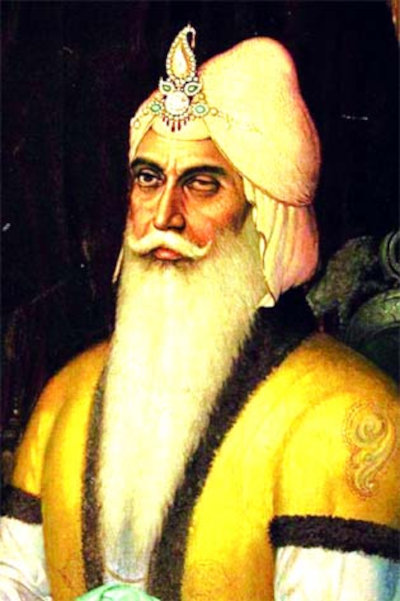 Maharaja Ranjit Singh
Maharaja Ranjit Singh
Even though Mashhad was a tortuous, months-long journey away from the regions of the Sikh Empire, the Jews of Mashhad were intimately linked to the homeland of the Sikhs. A generation earlier, the fearsome Persian ruler Nader Shah had conquered the Punjab region, as well as other vast swathes of territory in India. Known for his bloody cruelty, Nader Shah tortured and killed his enemies with abandon - Hindus, Muslims, Sikhs and others - and plundered as many priceless riches as he could from the Indian subcontinent.
Shah brought his treasures back to Mashhad for safekeeping. There was only one problem: Nader Shah was a Sunni Muslim and the majority of the population of Mashhad were members of the Shi’ite branch of Islam. He feared that local Shi’ites would turn on him and steal his riches. So, in 1741, Shah turned to nearby Jewish communities, forcing scores of Jewish families from their homes and communities to move to Mashhad, where they were compelled to guard his spoils.
The fact that Mashhad, as a holy Muslim city, was closed to non-Muslims didn’t bother Shah at all: He ordered a special quarter constructed for the Jews, separating them from the rest of the city. This ghetto was known as the “Idgah,” or “place of celebrations.” The Jews were considered dhimmis, people who were tolerated but had to put up with a lesser status than the Muslim majority, display obsequiousness to their Muslim betters, and pay special taxes.
For over 90 years, the Jews of Mashhad nonetheless flourished, building a vibrant community filled with a central synagogue, Jewish schools, and cultural institutions. Many of Mashhad's Jews worked as international traders, bringing vital industry to their corner of Persia. Yet they were often barely tolerated, resented for their separate religion and for their material success by their Muslim neighbors.
Anti-Jewish sentiment in Mashhad finally boiled over on March 27, 1839, two days before the start of Passover. Local Shi’ite Muslims had just celebrated a Muslim festival remembering the death of Imam Hussein, founder of the Shi’ite sect of Islam. Religious fervor was bubbling throughout the Muslim neighborhoods. Tragically, all it took was the actions of one teenage boy to bring it to a violent pitch.

A Jewish woman had consulted a local Muslim doctor about ways to cure what he diagnosed as a case of leprosy. Bizarrely, the doctor advised her to use dog blood as part of a cure. When he heard this, a local Muslim teenaged boy began yelling that a Jewish woman had taken a dog and named it Hussein, like the founder of their religion. Anu: The Museum of the Jewish People, in Tel Aviv, describes what happened next:
…try and visualize the picture. Thousands of Muslims are observing the (religious holiday) in the mosques, which includes self-flagellation and bloodletting to commemorate the suffering of their holy one, Hussein. And at the height of this ecstatic ritual, they hear that the dhimmi, who were residents of inferior status - and in this case the Jews - had dared to disrespect one of the holiest Muslims by naming a dog Hussein….
Shi’ite Muslims rampaged through the Jewish ghetto, attacking everyone they could find. The attackers raped Jewish women, kidnapped Jewish children, and murdered over 30 Jews during the pogrom. They burned down the town’s synagogue and stole Jewish property as they devastated the community. Finally, the attackers gave the Jews of Mashhad a devastating choice: either convert to Islam en masse, or else the mob would kill the Jews’ children.
About 300 of Mashhad’s Jews converted to Islam; local Muslims called it the Allahdad, or “God’s justice.” For generations, the Jewish community maintained their Jewish traditions and way of life in secret, much like the secret Jews of Spain during the Inquisition. Hundreds of Jews fled. Given their region’s historic links with the Punjab area, and the well-known openness of the Sikh Empire which ruled the Punjab at the time, many Jews fleeing Mashhad sought refuge there, particularly in the city of Rawalpindi, near the present-day Pakistani capital of Islamabad.
Once in Rawalpindi, the fleeing Jews of Mashhad settled in Rawalpindi's Babu Mohallah neighborhood. It was located close to the city’s main railway station, so it was an ideal location from which to continue working in international trade.
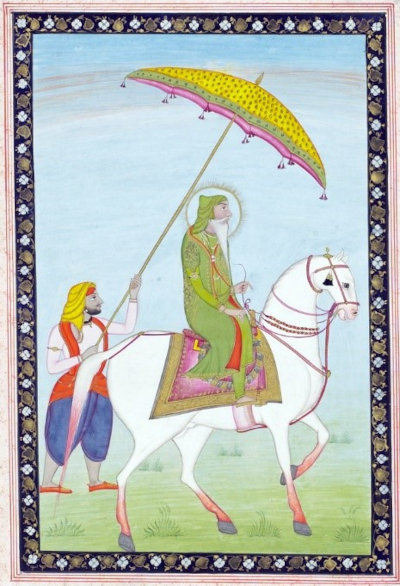 Maharaja Ranjit Singh on horseback, unknown artist, Punjab, 1838-1840. Museum no. IS.112-1953
Maharaja Ranjit Singh on horseback, unknown artist, Punjab, 1838-1840. Museum no. IS.112-1953
Transplanted to a new land, the Jews of Mashhad were no longer barely-tolerated hated interlopers as they had been back in Persia; in the Sikh Empire, these desperate Jewish refugees now enjoyed a level of security and respect they'd never had in Mashhad. The Jewish refugees built a beautiful synagogue and a communal hall in Rawalpindi, and flourished for over a century. Ranjit Singh, who founded the Sikh Empire, died in the same year that his kingdom welcomed Mashhad's Jews. Yet his legacy of openness and tolerance ensured that the Mashhad Jews remained safe in their new home.
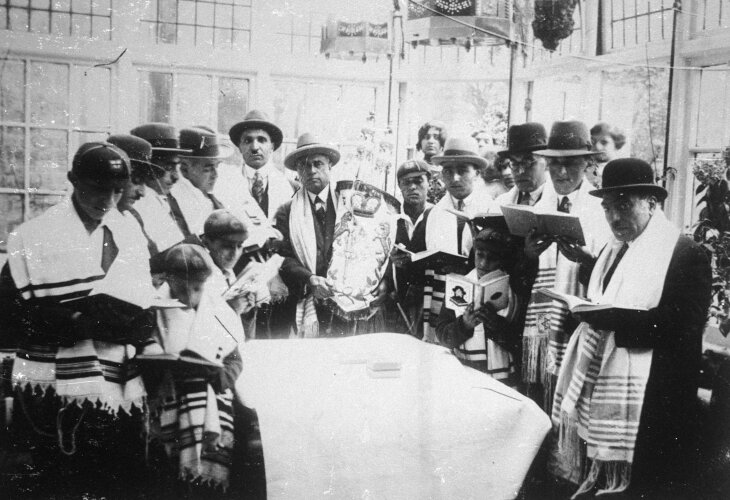 Mashadi Jewish Community Synagogue, The Jewish Museum London
Mashadi Jewish Community Synagogue, The Jewish Museum London
Jews remained in Rawalpindi long after the death of the Sikh Empire in 1849. Yet the tolerance and acceptance that the Sikh Empire showed to these desperate refugees should never be forgotten. In a terrible moment of deadly danger, the Sikh Empire opened its doors, saving the lives of hundreds of Jews.
With the partition of the Indian subcontinent into two nations, Pakistan and India, in 1947, most of the area’s Jews fled to India, settling predominately in Bombay, and later moving to Israel. Nearly all of the Jews who remained in Rawalpindi left in the 1960s.
Saif Tahir, a writer in Pakistan, visited the old Jewish neighborhood in Rawalpindi in 2016 and found it completely devoid of Jews; locals were too afraid to even talk about the Jews who once lived in their city. He did find one old synagogue that was still standing; the exterior of the building was adorned with Jewish stars of David. Tahir noted that it looked much like a synagogue in India built by Jews from Iraq and Iran in the 1800s.
The haven that the Jews of Mashhad found in 1839, when Rawalpindi was part of a progressive, open Sikh Empire, is long gone. The welcome and safety that they received there, when Rawalpindi was part of an expansive and open Sikh Empire, deserve to be remembered today.
Click here to read this version in Punjabi.

KHALISTAN ZINDABAD - May te great Sikh rule again and get out of indias genocide.
Thank you for this very well researched article. God bless everyone. Hopefully we Sikhs can get our own sovereign nation again. At the moment we are the same position, Jews were in before the creation of Israel. Khalistan Zindabad!
Thankyou for the info.
Very informative article. 1 correction, the Sikh Empire was not conquered but annexed by the British.
Thank you for sharing this. Maharaja Ranjit Singh was really a lion of Punjab. After his death in 1839, Punjab became orphan, and is still orphan after 184 years. Being a Sikh, I love this article.
Thanks for sharing this amazing history.......being a Sikh, can only say that the openness to welcome one and all is because we see God in every person and also stand up for the oppressed, irrespective of colour, religion, caste, creed, gender. Regards.
This topic is extremely interesting.
Can you provide some sources for further reading?
This is a good article. The Sikhs I have met are good people. I think their community has a good history, especially when it comes to facing up to physical threats. This should set an example for us.
Sikh nation can learn from Jews how to survive and flourish in difficult times as minority by giving highest education and keeping culture to our young generation
Thank you. I’m a Sikh but I never knew this. After the end of Sikh Empire, the Sikhs have been treated the same way the Jews were back in the days. Jews finally became safe after creation of Israel in 1948. Sikhs are still getting killed in India because we are “monotheistic” and different than polytheistic hindus. About 30,000 Sikhs were killed in 1984 Sikh Genocide, more than 100,000 were killed later from 1984-1995. Millions of Sikhs have migrated to western countries due to safety concerns. Sikhs still do not have safety of their own country. This is a great article. Maybe Jews can help Sikhs through diplomatic means.
You're a Khalistani.
Khalistani propaganda!
The reality is that Sikhs in India reject Khalistan.
You must be joking lol. Khalistani propagandist, funded by Pakistan, will never talk about how Sikhs have disappeared in Pakistan and flourished in India. Or that anti Hindu Congress party sponsored the pogroms in response to Indira Gandhi actions against khalistani.
Sikh emperor Maharaja Ranjit Singh voted as greatest leader of all times by BBC world histories magazine. Singh was nominated by Mathew Lockwood, a History professor in Alabama.
https://www.yahoo.com/now/greatest-leaders-bbc-poll-095652054.html
Living in an area of Australia known for its Sikh community one is acutely aware of two things - 1) The strength of the Sikh community's support of its own cultural memory, this through traditional attire and the preservation of language and family values 2) the practice of charity and strong outreach to communities in distress - be that food charities that feed and house those fallen down in there luck; those suffering from fire and flood; and a willingness to support at a leadership level well respected communal organisations.
Do these attributes sound vaguely familiar to us all?
I took two online quizzes about my beliefs. The questions were multiple choice. Sometimes none of the answers fit me very well, but I always picked the answer that was closest. On one quiz, they said my beliefs were 96% consistent with Orthodox Judaism. (That sounds accurate.) The other quiz said my beliefs were most consistent with Sikhism. (I though where did they get that?) Now that I learned that the Sikhs are monotheists, that makes more sense.
Guru Nanak was the founder of Sikhism who preached a revolutionary liberating philosophy of universal humanism –liberty, love, respect, justice and equality for all including women. Here is a link to a small PDF which quotes from his own sacred hymns enshrined in Sikh scriptures. .
https://ia802201.us.archive.org/28/items/NanakianPhilosophygurmatThePathOfEnlightenment/NanakianPhilosophygurmatThePathOfEnlightenment.pdf
The Sikh religion shares many similarities with Judaism.
Very interesting. Well researched and well written. Kudos.
RANJIT SINGH JI WAS A GREAT GREAT MAN G-D BLESS HIM
This article touched me deeply. God bless Israel. SHALOM 🙏 Israel!!!
extremely interesting story, I love these stories of diaspora communities around the world and throughout history. It proves how incredibly enduring Judaism is.
Oh wow. Thank you for this article. I am glad two oppressed religions and communities somehow found a soothing contact with each other. Never ever knew this because 1) our documentation procedures are poor, and 2) media penetration is poor due to atomized society which does not allow Sikh media to attain any momentum. Partition meant uprooting of Sikhs from Rawalpindi too. Depressing that today neither Jews and nor Sikhs are in Rawalpindi.
Does Aish really need to keep printing articles where Jews are the eternal victims?
It's depressing.
How about articles on Jewish victories?
I understand well where you're coming from but the sad reality is that we Jews have become too comfy in pursuing a good life taking freedom of religion for granted. We need reminders, especially in the weeks preceding the High Holy days, that our brethren in distant lands lived on edge never knowing what the next day would bring.
There are many of those too, like the one about Emma Lazarus or the lady who founded the Settlement House, or Golda Meir.
it's heartening to know that people I thought would not have any connection with the Sikh empire, let alone Sikh religion, were able to highlight how a Sikh 'raja' (king) was able to demonstrate the pillars of Sikhi (equality, worship of one god, saint/soldier principles) in his kingdom.
Thank you.
The soldier principle is a good one to emulate.